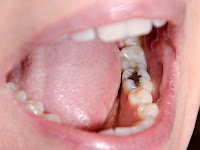Teeth without Enamel: Causes, Treatment and Care
 Below is an excerpt from an article found on Colgate.com that was written by Katriena Knights
Below is an excerpt from an article found on Colgate.com that was written by Katriena KnightsEnamel is the hardest substance in the human body, and is therefore vital to the health of your teeth. Not everyone's is the strongest, though, and still others have teeth without enamel at all. Without enamel to protect the softer interior parts of your teeth, they can't stand up to the stress of natural biting and chewing. These abnormal developments require special care and treatment.
Enamel Hypoplasia
Teeth can come in without enamel as a result of inherited issues or because of exposure to certain substances while the teeth are erupting. Baby teeth and permanent teeth can both emerge with enamel that is weak, improperly formed or missing altogether. One of these conditions is enamel hypoplasia, which literally means "underdeveloped enamel." A disorder that causes the teeth to develop with thin, deficient enamel, it sometimes manifests as a pit in the tooth ñ or even a hole. In advanced cases, there is no enamel at all, leaving the more sensitive dentin exposed.
Under normal conditions, per the American Academy of Pediatric Dentistry (AAPD), special cells in the teeth called ameloblasts form the cells of the tooth enamel. If these ameloblasts are damaged or do not fully develop, the enamel can't develop normally either.
What Causes It
Many factors can cause enamel hypoplasia. These include:
- Poor nutrition during pregnancy or infancy.
- Infection during pregnancy or infancy.
- Genetic disorders.
- Trauma to the teeth or jaw.
- Exposure to certain substances during pregnancy or infancy.
Nonetheless, it's often difficult to determine exactly what caused the teeth to develop abnormally.
To read the entire article visit Colgate.com.
The remainder of the article details the following:
- Enamel Hypomineralization
- How to Treat It



Comments
Post a Comment